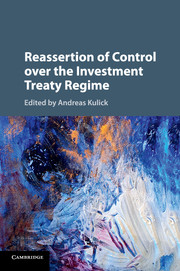Book contents
- Frontmatter
- Contents
- List of Contributors
- Preface
- PART I Introduction, Theory and Domestic Law Approaches
- 1 Reassertion of Control: An Introduction
- 2 Masters and Guardians of International Investment Law: How to Play the Game of Reassertion
- 3 Reassertion of Control and Contracting Parties' Domestic Law Responses to Investment Treaty Arbitration: Between Reform, Reticence and Resistance
- PART II Procedural Aspects and Avenues of Reassertion
- PART III Substantive Aspects and Avenues of Reassertion
- PART IV Reassertion of Control: Policy and Trends
- Index
3 - Reassertion of Control and Contracting Parties' Domestic Law Responses to Investment Treaty Arbitration: Between Reform, Reticence and Resistance
from PART I - Introduction, Theory and Domestic Law Approaches
Published online by Cambridge University Press: 12 January 2017
- Frontmatter
- Contents
- List of Contributors
- Preface
- PART I Introduction, Theory and Domestic Law Approaches
- 1 Reassertion of Control: An Introduction
- 2 Masters and Guardians of International Investment Law: How to Play the Game of Reassertion
- 3 Reassertion of Control and Contracting Parties' Domestic Law Responses to Investment Treaty Arbitration: Between Reform, Reticence and Resistance
- PART II Procedural Aspects and Avenues of Reassertion
- PART III Substantive Aspects and Avenues of Reassertion
- PART IV Reassertion of Control: Policy and Trends
- Index
Summary
A. Introduction
History shows that attempts by States to reassert control over international investment law and dispute settlement are a cyclical phenomenon, which manifests itself in various forms. Resistance is one of them. The foremost and oft-cited example of resistance towards the internationalisation of investment protection is the Calvo Doctrine, which underpinned an historical opposition by Latin American States to diplomatic protection and the notion of international minimum standard. The doctrine has exerted considerable influence on the subsequent development of international norms on investment protection, from the ground breaking resolutions by the UN General Assembly (which purported to replace the idea of internationalisation of investment disputes with the principle of national treatment) to more recent calls to reinstate the local remedies rule in investment arbitration. Although the practical significance of the UN resolutions was subsequently obliterated by an en masse treatification of international investment law, whereby even the staunchest detractors of internationalisation signed investment treaties and joined the ICSID Convention, the echoes of Calvo's influence on national approaches can still be traced in existing investment protection instruments.
More recently, reassertion of control through resistance to the internationalisation of investment protection and dispute settlement has manifested in a withdrawal by States (mostly developing countries) from the investment protection regime. To mention a few, in 2007, Bolivia submitted a written notice of its denunciation of the ICSID Convention, and a similar step was later taken by Ecuador in 2009. Furthermore, the Ecuadorian Constitution has been amended to expressly prohibit international arbitration of investor-State disputes. In 2009, Russia officially announced its decision to withdraw from the Energy Charter Treaty. Indonesia, too, has recently confirmed its intention to terminate and renegotiate more than sixty bilateral investment treaties.
The current trend towards reassertion of control over investment protection and dispute settlement has not been limited to developing countries alone. As observed by the editor in Chapter 1, for the first time in the history of international investment law the interests of States parties, both developed and developing, are becoming approximated in the sense of their shared dissatisfaction with the drafting patterns on which the bulk of existing investment treaties are modelled.
- Type
- Chapter
- Information
- Reassertion of Control over the Investment Treaty Regime , pp. 53 - 80Publisher: Cambridge University PressPrint publication year: 2016
- 2
- Cited by



